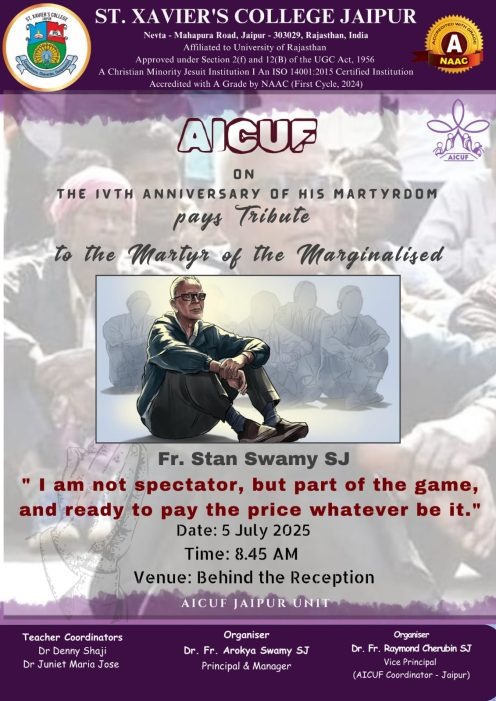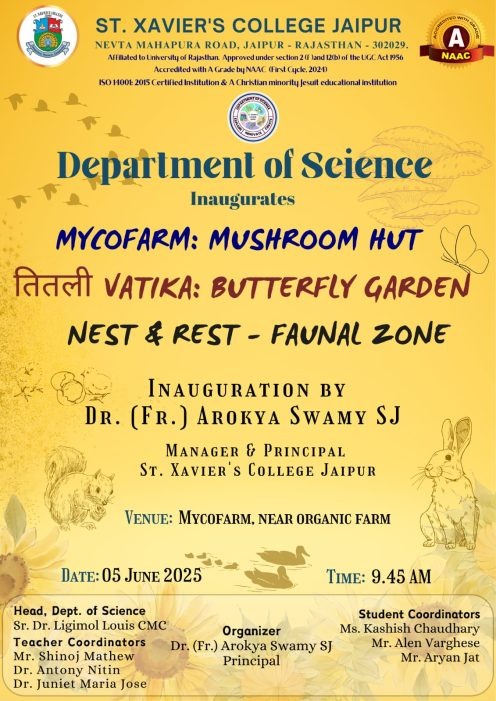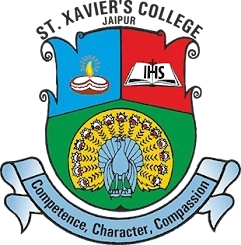
About Us
Home > About











IGNITING A PASSION FOR LEARNING
Xavier Alumni Society
The Xavier Alumni Society established in 1950, as a registered charitable society managed by the Jesuits, has been pursuing the legacy of St. Francis Xavier of promoting human fulfilment by means of training and education in India. Following the motto of the founder of the Society of Jesus, St. Ignatius of Loyola, the college has been working for “The Greater Glory of God” (Ad Majorem Dei Gloriam).
In 2006, Xavier Vocational Institute (X.V.I.) was set up in Jaipur to give vocational training to the weaker sections of the society. In 2010, J.X.E.A. in collaboration with Xavier Alumni/ae and well-wishers of Jaipur under the leadership of Rev. Fr. Varkey Perekkatt, SJ, established St. Xavier’s College Jaipur. Since then, the college has grown manifold, serving the educational needs, not only of the people of Jaipur but also of the nation. Over the last 10 years we have grown from a sapling to a huge oak, as every year the college has reached new milestones. In 2014, the college was declared a Christian Minority Jesuit Institution and in the same year, the status of college was elevated to the Postgraduate the level with the initiation of two courses, namely, Masters in English Literature and Human Resource Management. In the year 2017, the college was granted Permanent Affiliation for B.A. Honours in Economics and English Literature from the University of Rajasthan. The following year was a testament to our success as the student strength crossed over 2000, and the number of undergraduate courses rose to six – B.A.(Honours)- English, Economics, Political Science; BBA, BCA and B.Com. and the number of postgraduate programmes turned to 5 – M.A.(English), M.A.(Economics), M.Sc. (IT), M.Com.(EAFM, ABST) and M.H.R.M. Another achievement followed in 2019 when the college got recognition under section 2(f) and 12(B) of UGC Act 1956. In addition to this, in the same year, all the undergraduate departments along with M.A. English Literature got permanent affiliation from the University of Rajasthan, Jaipur (Rajasthan). After a magnificent decade, right in the heart of the city, the college shifted to the new campus at Nevta, Jaipur in the session 2021-22 to provide bigger and better infrastructural and academic possibilities to the students. In 2022- 23, Professional Programmes – MBA and MCA have been introduced by the college through its New Technical Institution – Xavier Institute of Management and Informatics (XIMI) in the same Campus. The Department of English and Business Administration have also been approved as Research Centres for PhD Programme.

Saint Ignatius of Loyola - Our Founder
St. Ignatius grew up in Spain and lived a rather luxurious life. He frequented the court and developed a taste for a lavish life style, especially with the ladies. Ignatius was involved with gambling and was a very confrontational man. After some legal issues in his youth he found himself at the age of 30 in the Spanish army defending the Spanish town of Pamplona against the French. During this battle, his commander wanted to retreat because they were outnumbered, but Ignatius convinced the commander to stay out of honour. During this battle a cannon ball struck Ignatius’ legs. The French soldiers, impressed with his courage, carried him back to his home rather than to prison. In the hospital, Ignatius needed to have his leg reset without anesthesia. Due to an infection the doctors told him to prepare for death. On the feast day of Saints Peter and Paul, Ignatius miraculously got better. The leg healed in such a way as to cause a big bump which prevented him from wearing the long fitted boots that Spanish soldiers wore. So he told the doctors to fix it, all without anesthesia. In the end, the operation didn’t fully work and ever since Ignatius always walked with a limp.
During the long recovery Ignatius asked for some romance novels to pass the time. All the hospital had were books on the life of Christ and the saints. Desperate from boredom, Ignatius began to read them. As he read the saints he saw their lives more and more worth imitating. However, he continued his daydreams of fame, wealth and the fantasies of winning the love of a certain noble lady of the court. However, Ignatius received an insight that would mark his life and the history of Christianity. When he read the Life of Christ’s and the Loves of Saints’ lives he felt a deep peace, joy and an increase of love and confidence in God. On the contrary when he fantasized a life with women and riches and honours he was filled with uncertainty, doubt, fear and no real awareness of God. From here he began to develop what is called “The Rules for the Discernment of Spirits.” He ended up writing down basic rules to help a person sift through the different moods and movements within one’s heart to see which ones were from God and to embrace these thoughts and desires and to discern which thoughts and desires were from the enemy and to reject those. These rules came from Ignatius paying close attention to his own heart’s movements during his time in the hospital. Eventually, Ignatius gave up his old pursuits and left the hospital a new man. He decided to travel to Jerusalem to walk in the same places of our Lord. Although Ignatius now wanted to serve the Lord, he was not yet a saint. During his trip he met a foreign man. They were both riding on mules and they began discussing the truths of the faith. The man told Ignatius that he didn’t believe in Mary’s perpetual virginity. Ignatius was enraged, and as the man rode off down one path Ignatius wanted to kill this man to honor our Lady. Ignatius decided at the fork in the road, he would let his mule decide. If it went down the same path as the man he would kill him, if not he would go on peacefully. The mule went down the other path and Ignatius went on with his journey. As the years went on, Ignatius got ordained, began a religious order known as Society of Jesus also known as the Jesuits and worked diligently in Rome for the sake of his order throughout the world. He died due to stomach complications, most likely because of his extreme fasts. His order continues and runs several universities across the globe.
St. Ignatius is a model of passion for us. So many world religions involve the removal of desires or emotions and the ignoring of personal experience. It’s easy to fall into this trap by thinking that spirituality is about getting rid of the bodily dimension of our existence. But for St. Ignatius and the Catholic tradition God took on human nature in Jesus and by doing so affirmed all that is authentically human. In fact, throughout the gospels Jesus invites us to tell him our desires: “What are you seeking? (Jn 1:38),” “What do you want me to do for you? (Mk 10:51),” “Do you want to be well? (Jn 5:6).” So with the help of St. Ignatius, let us tell God what we desire for Him to do for us.












Our Aim
Like other Jesuit educational institutions, St. Xavier’s College, Jaipur aims to train young men and women who would contribute to the society as creative leaders and responsible citizens, committed to the service of the people. Every effort is made to see that the students become intellectually equipped, morally upright, socially committed, and spiritually awakened to God’s uniting presence in the whole world. The Christian doctrine of love and service well paraphrased by Christ in ‘love thy neighbour as thyself’ provides the bedrock of education that is offered here, and illuminates and directs all our activities and projects.
The Meaning of the College Emblem
The motto on the college crest: Competence, Character and Compassion encodes the core values sought by the college, and challenges every student who passes through the portals of St. Xavier’s College, Jaipur is expected to imbibe the high ideals of the college: acquiring personal integrity and excellence in everything.
The burning lamp represents Lord Jesus Christ who said, “I am the light of the world” (John 8:12), and the Wisdom of God. True education leads one from the darkness of ignorance to the light of genuine knowledge and enlightenment.
The open book symbolizes the time tested, quality educational tradition of the Jesuits and their commitment to carry it forward. The inscription “IHS,” placed above the open book is taken from the official seal of the Society of Jesus, used by the founder St. Ignatius of Loyola. These are the first three letters of the Latinized Greek word HISOVS, meaning ‘Jesus’. The cross shown above the letter ‘H’ reminds the world that Jesus Christ died on the Cross for the salvation of mankind.
The peacock is the national bird of India. It symbolizes beauty, grace, and pride in the nation, its natural resources and cultural diversity. It inspires a sense of mysticism encouraging us to aim for higher values.






Address
Nevta, Mahapura Road, Nevta, Jaipur, Rajasthan 302029


Contact
08062757001 / 07482047793
Timings
10:00 AM - 06:00 PM
All Days Open
This website is owned and managed by | Xavier Alumni Society
